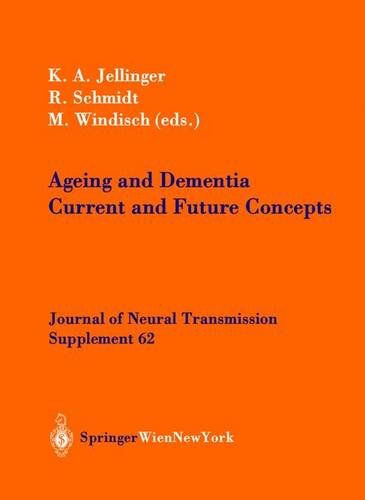图书简介
Epidemiological studies, modern clinical, neuroimaging, neuropsychological, molecular biological, and genetic studies have considerably enhanced our knowledge about ageing processes of the human brain, its sequelae, diagnostic, and therapeutic possibilities and limits. In addition to Alzheimer’s disease and other degenerative dementias, the impact of cerebrovascular lesions and their risk factors in the pathogenesis of cognitive disorders of the aged are increasingly acknowledged, and the recognition of mild cognitive impairment as a frequent initial stage of developing dementia is becoming an increasingly important diagnostic and therapeutic problem. The included papers were presented at the 7th International Symposium in Graz, Sept. 2001 and give a timely overview of the current and future concepts of pathogenesis, diagnosis, and treatment strategies of pathological brain ageing and dementias, early recognition of mild cognitive impairment and future possiblities of prevention of dementing processes.
Vascular-ischemic dementia: an update.- Frequency of white matter lesions and silent lacunar infarcts.- CT and MRI rating of white matter changes.- Risk factors and progression of small vessel disease-related cerebral abnormalities.- Microangiopathy-related cerebral damage and angiotensinogen gene: from epidemiology to biology.- Can small-vessel desease-related cerebral abnormalities be used as a surrogate marker for vascular dementia trials?.- Reactive oxygen: its sources and significance in Alzheimer disease.- Dysregulation of neuronal differentiation and cell cycle control in Alzheimer’s disease.- A broader horizon of Alzheimer pathogenesis: ALZAS — an early serum biomarker?.- Is mild cognitive impairment bridging the gap between normal aging and Alzheimer’s disease?.- Vienna Transdanube Aging “VITA”: study design, recruitment strategies and level of participation.- Conversion from preclinical to clinical stage of Alzheimer’s disease as shown by decline of cognitive function in carriers of the Swedish APP-mutation.- The role of biological markers in the early and differential diagnosis of Alzheimer’ disease.- Measuring cognition in advanced Alzheimer’s disease for clinical trials.- Current drugs and future hopes in the treatment of Alzheimer’r disease.- Development of human antibody fragments directed towards synaptic acetylcholinesterase using a semisynthetic phase display library.- Long-term stabilizing effect of cholinesterase inhibitors in the therapy of Alzheimer’ disease.- Impact of muscarinic agonists for successful therapy of Alzheimer’s disease.- Nicotinic receptor modulation: advantages for successful Alzheimer’s disease therapy.- Glutamate receptors as a target for Alzheimer’s disease — are clinical results supporting the hope?.- Can estrogen play a significant role in the prevention of Alzheimer’s disease?.- Neurotrophic factors and Alzheimer’s disease: are we focusing on the wrong molecule?.- Nerve growth factor and cholinergic CNS neurons studied in organotypic brain slices.- Sustained improvement of cognition and global function in patients with moderately severe Alzheimer’s disease: a double-blind, placebo-controlled study with the neurotrophic agent Cerebrolysin®.- Improved global function and activities of daily living in patients with AD:.a placebo-controlled clinical study with the neurotrophic agent Cerebrolysin®.- Genomics and dementia — new drug targets ahead?.- Are ?-sheet breaker pertides dissolving the therapeutic problem of Alzheimer’s disease?.- Glycoxidative stress creates a vicious cycle of neurodegeneration in Alzheimer’s disease — a target for neuroprotective treatment strategies?.- Pharmacological targets to inhibit Alzheimer neurofibrillary degeneration.- Generation and brain delivery of anti-aggregating anti-bodies against ?-amyloid plaques using phage display technology.- Effects of Cerebrolysin™ on amyloid-? deposition in a transgenic model of Alzheimer’s disease.- Vitamin E binding protein Afamin protects neuronal cells in vitro.- Recent developments in the pathology of Parkinson’s disease.
Trade Policy 买家须知
- 关于产品:
- ● 正版保障:本网站隶属于中国国际图书贸易集团公司,确保所有图书都是100%正版。
- ● 环保纸张:进口图书大多使用的都是环保轻型张,颜色偏黄,重量比较轻。
- ● 毛边版:即书翻页的地方,故意做成了参差不齐的样子,一般为精装版,更具收藏价值。
关于退换货:- 由于预订产品的特殊性,采购订单正式发订后,买方不得无故取消全部或部分产品的订购。
- 由于进口图书的特殊性,发生以下情况的,请直接拒收货物,由快递返回:
- ● 外包装破损/发错货/少发货/图书外观破损/图书配件不全(例如:光盘等)
并请在工作日通过电话400-008-1110联系我们。
- 签收后,如发生以下情况,请在签收后的5个工作日内联系客服办理退换货:
- ● 缺页/错页/错印/脱线
关于发货时间:- 一般情况下:
- ●【现货】 下单后48小时内由北京(库房)发出快递。
- ●【预订】【预售】下单后国外发货,到货时间预计5-8周左右,店铺默认中通快递,如需顺丰快递邮费到付。
- ● 需要开具发票的客户,发货时间可能在上述基础上再延后1-2个工作日(紧急发票需求,请联系010-68433105/3213);
- ● 如遇其他特殊原因,对发货时间有影响的,我们会第一时间在网站公告,敬请留意。
关于到货时间:- 由于进口图书入境入库后,都是委托第三方快递发货,所以我们只能保证在规定时间内发出,但无法为您保证确切的到货时间。
- ● 主要城市一般2-4天
- ● 偏远地区一般4-7天
关于接听咨询电话的时间:- 010-68433105/3213正常接听咨询电话的时间为:周一至周五上午8:30~下午5:00,周六、日及法定节假日休息,将无法接听来电,敬请谅解。
- 其它时间您也可以通过邮件联系我们:customer@readgo.cn,工作日会优先处理。
关于快递:- ● 已付款订单:主要由中通、宅急送负责派送,订单进度查询请拨打010-68433105/3213。
本书暂无推荐
本书暂无推荐
















